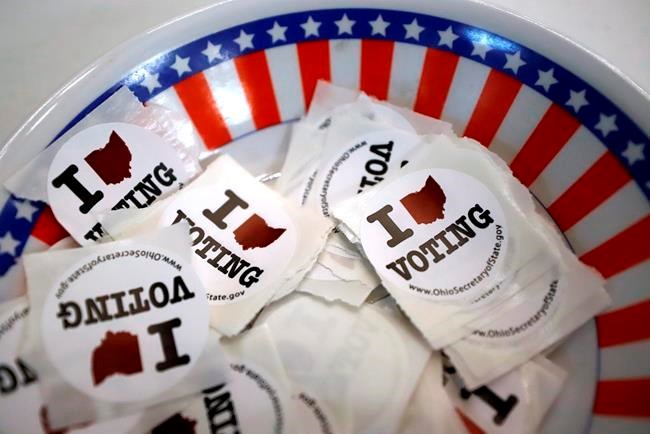WASHINGTON, Wash. — Daylong lineups, pernicious warnings of voter fraud, civil unrest, intimidation and catching a deadly virus: casting a ballot in the United States this year is a stressful and risky endeavour.
For most voters, then, the uniquely American political oddity known as the electoral college is likely not top of mind at the moment.
Barry Fadem is not most voters.
"We're electing the president of the battleground states," said Fadem, a California lawyer and longtime champion of revamping the way the U.S. chooses its presidents.
"These are the states both parties go after, because it's close enough that they think they can win it. But, you know, do the math — 42 states are left out of the presidential election."
Fadem is president of National Popular Vote, a non-profit association that's on a mission to make the results of American presidential elections more reflective of the will of the people.
Out of the last 45 contests, five have produced commanders-in-chief who did not win the majority of the popular vote, including George W. Bush in 2000 and Donald J. Trump in 2016.
"No offence (to Canada), but we consider (the U.S. election) the most important election in the world," Fadem said.
"Yet the rule that we are known for around the world — whoever gets the most votes at the end of the night is the winner — doesn't apply to the most important election the world, and no justification can be made for it today."
Fadem credits National Popular Vote chairman John Koza, a computer scientist, former Stanford University professor and the man who invented scratch-off lottery tickets, with the group's proposed solution.
First, however, a civics lesson.
In Canada, it's understood that voters don't choose prime ministers, but rather they choose local members of Parliament, whose numbers and political affiliations determine the party in power.
Technically, Americans don't elect their presidents, either. It's the electoral college, 538 electors chosen by state legislatures to reflect the results in their states. Winning 270 or more means a trip to the White House.
In most cases, all of a state's electors go to the candidate who gets the most votes in the state; Maine and Nebraska also use the results at the district level to allocate a share of their votes.
That state-by-state process is why it's possible to become president without winning the national popular vote. Hillary Clinton got 2.87 million more votes, but lost to Trump in the Electoral College, 306 to 232.
In point of fact, seven "faithless electors" actually voted in 2016 for someone other than the candidate to whom they were pledged: two in Trump's column and five in Clinton's.
The rules are enshrined in the U.S. constitution. But so too is the power the states have to decide amongst themselves how to follow them.
Enter National Popular Vote's Interstate Compact, an agreement among states to allocate electoral college votes in accordance with the national popular vote.
So far, 15 states and the District of Columbia have signed on to the compact, for a total of 196 electoral votes. Fadem said he believes they can get to 270 before the 2024 election.
"I'm not sure there's anyone in the entire United States now who doesn't understand and get this whole electoral college and popular vote issue," he said.
"In terms of a tipping point, no matter what happens in this election, I think people are gonna be more motivated to want to take action."
A majority of Americans have long opposed the way presidents are chosen, said John Fortier, director of government studies at the Bipartisan Policy Center in Washington and author of the 1983 book "After the People Vote: A Guide to the Electoral College."
But they've never felt strongly enough to do much about it.
"I do think the American people have almost always been against this, or at least if they thought they were starting from scratch, (they would) prefer a system that's more of a national popular vote," Fortier said.
"It's on people's minds, but I don't think it's necessarily the highest thing, the thing that they most want to change."
It might well move up the list, he added, should the election produce another result that's out of step with the popular vote — a very real fear in a surreal election year.
Voters trying to cast ballots early are already enduring hours-long lineups, many showing up in person for fear a mailed vote won't arrive or be counted in time. And they're doing it during a fresh wave of COVID-19.
Trump has been urging his supporters to "watch carefully" at the polls on election day, an invitation critics consider tantamount to voter intimidation.
And he has badmouthed mail-in ballots, claiming without evidence they are a vector for electoral fraud, fuelling concerns he may declare a premature victory on Nov. 3 before all the votes can be counted.
The question of whether the current president will linger and contest the results in court is just one of many questions that provided a backdrop to this week's Supreme Court confirmation hearings on Capitol Hill.
Amy Coney Barrett, Trump's nominee to replace Ruth Bader Ginsburg on the top court, promised members of the Senate judiciary committee to consider recusing herself should such a dispute arise.
"I will consider all factors that are relevant to that question," Barrett said Wednesday. "I do assure you of my integrity and I do assure you that I would take that question very seriously."
This report by The Canadian Press was first published Oct. 18, 2020.
James McCarten, The Canadian Press



